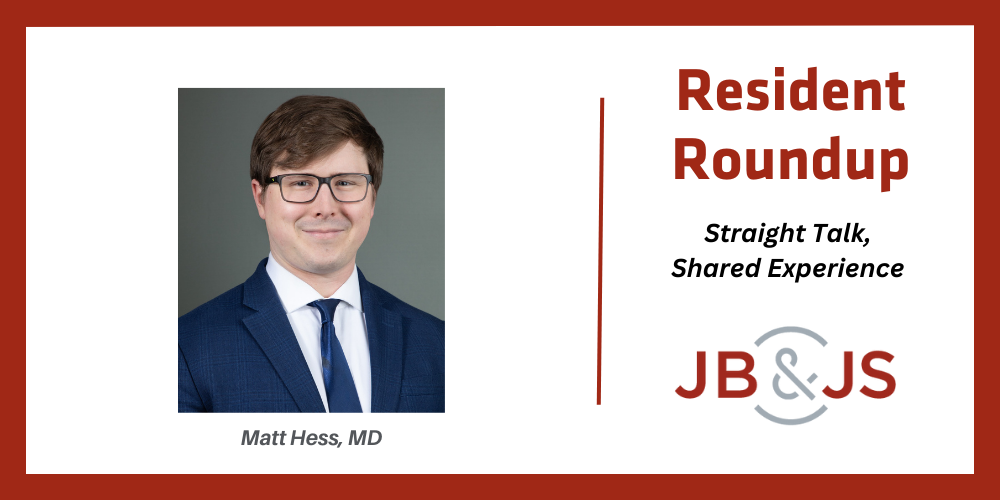This Resident Roundup post comes from Matt Hess, MD, who is a fellow in orthopaedic oncology at The University of Chicago.
Moving across the country for a career opportunity is not unique to the medical field, let alone orthopaedic surgery. However, pursuing 1-year subspecialty training in a new institution, or taking on a short-term rotation as a medical trainee, can be an initially isolating experience. This may be even more true when moving without or away from family, friends, or loved ones.
I completed both medical school and residency at the same institution before moving temporarily away from my spouse to complete my fellowship year. The first few months of fellowship felt like the start of medical school and like being an intern again. The people, the logistics, the expectations, and the culture were all new and, at times, overwhelming. On reaching out to my co-residents with whom I graduated—even those who had traveled with spouses or loved ones—I found that this was a largely shared experience.
However, what was unexpected to me was the isolation and loneliness that accompanied the transition. This occurred despite extremely welcoming faculty, residents, and staff at my new institutions. I’d maintained close contact with my loved ones, but it felt like something was missing. Eventually I realized I was missing the fulfillment that accompanies the camaraderie of the residency experience. That is, seeing and working each day with long-term friends, with whom you share a common goal and interest. The antidote to the numerous mental and emotional challenges of medical training is not only a deep connection with patients, but also the shared struggle with one’s colleagues.
This early fellowship experience led me to reflect on the fellows I’d worked with in the past, many of whom were international medical graduates seeking one- or sometimes multi-year fellowships in the U.S. They were often single or moved without spouses, isolated from their family, living abroad, and facing additional challenges, such as cultural and language divides. I realized how much more challenging it must have been for them. Aside from 1-year clinical fellows, other transient medical personnel and short-term-traveling trainees (i.e. visiting medical students, research fellows, etc.) likely also share a similar experience of isolation.
All of these parties face the difficulty of getting quickly integrated into the team dynamic and existing camaraderie. A short time frame coupled with the state of limbo between resident and attending seems to create early challenges in organically forming bonds. On an individual and informal level, simply a welcoming attitude or an invitation to an after-work event can have a large impact. On a formal level, department and residency leadership could be instrumental in extending organized activities to include fellows and other short-term personnel. A welcome party at the beginning of the academic year, team-building activities, or after-hours educational events, such as journal clubs or cadaver labs, are some examples for inclusion.
For our part, fellows can attempt to be proactive, engaging with co-fellows or reaching out to fellows at other institutions doing similar training. Focusing on general wellness and capitalizing on the relatively increased free time of fellowship can also be hugely beneficial. Most importantly, fellows should utilize our extra knowledge, experience, and time to contribute to the education of residents, medical students, and staff.
For residents, think about connecting with your fellows and taking advantage of their unique position in the hierarchy. Even though it’s a short-term relationship, the orthopaedic community is small. Fellow-led education can occasionally even exceed the efficacy of faculty-led education when the pressure to “look good for the attendings” is removed. Upper-level residents are often most settled into their roles and well-positioned to make a large impact on integrating fellows. The overall educational experience for residents is enhanced, while opportunities for mentorship may also emerge when camaraderie is established.
This isn’t something discussed often or publicly. As I’ve progressed through fellowship though, I’ve continued to feel it’s an important topic to raise. For the new fellows starting, expect to experience some discomfort and know that if that feeling lingers longer than expected, you are not alone. While I was made to feel included both formally and informally relatively quickly during my fellowship training, the fellowship experience can be an isolating time of toil and intense skill and career advancement. It can also be a time of personal growth, friendship, networking, and fun. Leadership, faculty, and residents should be aware of the isolation that accompanies short-term fellowship training and make a concerted effort to combat this with simple informal strategies as well as more formal, department-level initiatives.
Residents and Trainees: Join the Orthopaedic Conversation on OrthoBuzz
Interested in being published on the JBJS OrthoBuzz blog? Residents and trainees are invited to submit a post to Resident Roundup. Share your experience as a resident, connect with others in orthopaedic training, and add your viewpoint to the orthopaedic conversation. Find out more here. Questions and submissions can be sent to orthobuzz@jbjs.org .



